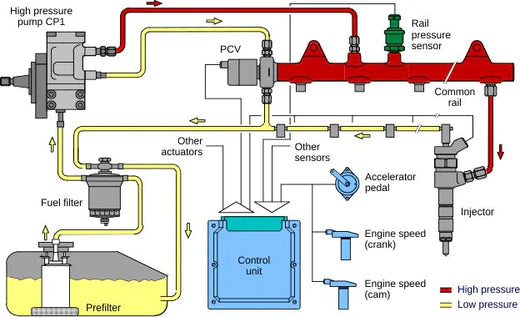What is a Fuel Pump?
Posted by MYCAR TEAM

Introduction: A fuel pump is a critical component in the operation of most internal combustion engine vehicles. Whether you drive a car, truck, motorcycle, or even some boats, you rely on a fuel pump to deliver the lifeblood of your engine – fuel. In this information page, we will explore what a fuel pump is, its types, functions, and why it's so vital to the proper functioning of your vehicle.
What is a Fuel Pump? A fuel pump is a mechanical or electrical device responsible for transferring fuel from the gas tank to the engine. It ensures that the engine receives a consistent supply of fuel at the appropriate pressure for combustion. This process is crucial for powering your vehicle and keeping it running smoothly.
Types of Fuel Pumps: There are two primary types of fuel pumps:
-
Mechanical Fuel Pump: These pumps are typically found in older vehicles and some carbureted engines. They are driven by the engine's camshaft or a dedicated lobe on the camshaft. Mechanical fuel pumps rely on the engine's motion to create a pumping action.
-
Electric Fuel Pump: Most modern vehicles use electric fuel pumps. These pumps are powered by electricity and are located either inside the fuel tank or near it. Electric fuel pumps offer precise control over fuel delivery and pressure, making them more adaptable to various engine configurations.
How Does a Fuel Pump Work? The operation of a fuel pump involves several key steps:
-
Fuel Intake: The pump draws fuel from the gas tank through an inlet line.
-
Pressurization: It pressurizes the fuel to the specific level required by the engine. This pressure ensures that fuel is delivered with force to the engine's fuel injection system or carburetor.
-
Fuel Delivery: The pressurized fuel is then sent through the fuel lines to the engine. In fuel-injected engines, it is sprayed directly into the combustion chamber, while in carbureted engines, it is mixed with air in the carburetor.
-
Timing: The fuel pump's operation is synchronized with the engine's timing to ensure that fuel is delivered precisely when needed for combustion.
Why Is a Fuel Pump Important? Understanding the significance of a fuel pump in your vehicle is crucial:
-
Efficient Combustion: A functioning fuel pump ensures that the engine receives the correct amount of fuel at the right pressure, leading to efficient combustion, better fuel economy, and improved performance.
-
Engine Longevity: Inadequate fuel delivery or pressure can lead to engine misfires and damage. A reliable fuel pump can extend the life of your engine.
-
Consistency: Electric fuel pumps provide better control over fuel delivery, ensuring consistent engine performance in various driving conditions.
-
Safety: Modern electric fuel pumps are designed to shut off in the event of a collision, reducing the risk of fuel leaks and fires, enhancing vehicle safety.
Conclusion: In summary, a fuel pump is an unsung hero in the world of automobiles, responsible for delivering the fuel needed to power your engine. Understanding what a fuel pump is and how it operates can help you appreciate its crucial role in keeping your vehicle running smoothly. Regular maintenance and prompt replacement when necessary are essential to ensure your vehicle's continued reliable performance.

